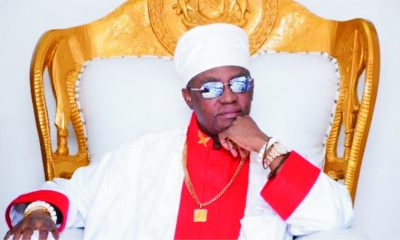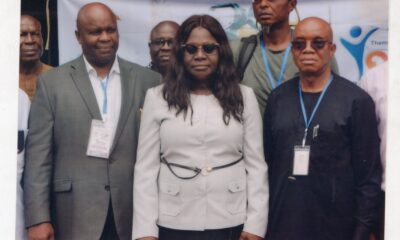Politics
Group, Lawmakers Decry Subsidy Removal
Lagos lawmakers and the Association of Professional Bodies of Nigeria (APBN), have reacted to the removal of petrol subsidy by the Federal Government, describing it as ill-timed and a painful pill.
While the lawmakers criticised it as unsuitable for now, the APBN called for the diversification of the country’s economy to cushion the hardship the subsidy removal would cause Nigerians.
Mr Segun Olulade, the Chairman, Lagos State House of Assembly Committee on Information, told The Tide that the removal should be differed in view of the security challenges facing the country.
“The fuel subsidy removal is not suitable at this critical period when Nigeria is facing serious security challenges.
“Some Nigerians are still nursing the wounds of bombings in some parts of the country; the President should take it easy with Nigerians, particularly at this celebration period.
“He should not add sorrow to the joy of many Nigerian celebrating the New Year,’’ he said.
Olulade said the old price regime should still hold sway since, according to him, the National Assembly has yet to ratify it.
“ Before embarking on the removal of the subsidy, necessary things should have been put in place,’’ the assemblyman added.
Another lawmaker, Mr Bolaji Yusuf (Mushin I) advised the government to address security challenges across the country.
“Removing the subsidy without finding solutions to threats to lives and property may not work,’’ he told The Tide.
Yusuf condemned the violence unleashed on the country by an Islamic sect, Boko Haram, saying killing of innocent souls particularly, during a church service on Christmas Day in Mambila, Niger, is callous.
He stressed: “The government should find urgent solutions to the menace caused by Boko Haram at this period and leave the subsidy for now”.
According to him, no foreign investor will stake his money where security of life and property are not guaranteed.
Yusuf, however, appealed to Nigerians not to take the laws into their hands in a bid to avenge the deaths of the innocent souls.
The President of APBN, Mr Segun Ajanlekoko, said the government should be proactive by putting in place measures that would alleviate the sufferings of the ordinary people.
He said the action might cause inflation and increase cost of production and unemployment.
“The Nigerian economy should be diversified. Agriculture should be promoted in all schools, colleges and universities, especially the faculties of agriculture.
“These institutions should be given annual targets of agricultural products production based on the local agricultural climates,” Ajanlekoko said in a statement.
He advised the government to engage unemployed graduates and school leavers in farming at all tiers of government.
“This will not only promote food sufficiency, but also generate revenue through food export,’’ he said.
Politics
INEC Denies Registering New Political Parties

The Independent National Electoral Commission (INEC) says it has not registered any new political parties.
The commission gave the clarification in a statement on its X (formerly Twitter) handle last Wednesday.
It described the purported report circulated by some online social media platforms on the registration of two new political parties by INEC as fake.
“The attention of INEC has been drawn to a fake report making the rounds about the registration of two new political parties, namely “Independent Democrats (ID)” and “Peoples Democratic Movement (PDM)”.
“For the avoidance of doubt, the commission has not yet registered any new party. The current number of registered political parties in Nigeria is 19 and nothing has been added,” it stated.
The commission recalled that both ID and PDM were registered as political parties in August 2013.
INEC further recalled that the two were deregistered in February 2020 in accordance with Section 225A of the 1999 Constitution of the Federal Republic of Nigeria.
The commission, therefore, urged the public to disregard the said report.
Politics
You Weren’t Elected To Bury People, Tinubu Tells Alia

President Bola Tinubu has asked Governor Hyacinth Alia to work more for peace and development of Benue State, saying he was elected to govern, not to bury people.
The President said this while addressing stakeholders at the Government House, Markudi, last Wednesday.
He also called on the governor to set up a peace committee to address some of the issues in the state.
The meeting included the Secretary to the Government of the Federation (SGF), George Akume, traditional rulers, and former governors of the state.
The governors of Kwara, Imo, Kogi, Plateau, Ondo, and Nasarawa states also attended the meeting.
“Let us meet again in Abuja. Let’s fashion out a framework for lasting peace. I am ready to invest in that peace. I assure you, we will find peace. We will convert this tragedy into prosperity,” he said.
President Tinubu urged Governor Alia to allocate land for ranching and directed the Minister of Agriculture and Food Security to follow up.
“I wanted to come here to commission projects, to reassure you of hope and prosperity, not to see gloomy faces. But peace is vital to development.
“The value of human life is greater than that of a cow. We were elected to govern, not to bury people”, he stressed.
He charged Governor Alia on working with the Federal Government to restore peace.
“Governor Alia, you were elected under the progressive banner to ensure peace, stability, and progress. You are not elected to bury people or comfort widows and orphans. We will work with you to achieve that peace. You must also work with us”, he said.
In his remarks, Governor Alia appealed to the Federal Government to establish a Special Intervention Fund for communities affected by repeated violent attacks across the state.
“Your Excellency, while we continue to mourn our losses and rebuild from the ashes of pain, we humbly urge the Federal Government to consider establishing a special intervention fund for communities affected by these incessant attacks in Benue State,” he said.
Governor Alia said the fund would support the rehabilitation of displaced persons, reconstruction of destroyed homes and infrastructure, and the restoration of livelihoods, especially for farmers.
He reiterated his support for establishing state police as a lasting solution to insecurity.
The governor pledged his administration’s full commitment to building a safe, stable, prosperous Benue State.
Also speaking at the meeting, the Chairman of the Benue State Traditional Rulers Council, Tor Tiv, Orchivirigh, Prof. James Ayatse, praised President Tinubu for being the first sitting President to personally visit victims in the hospital in the wake of such a tragedy.
He thanked the President for appointing notable Benue indigenes into key positions, including the Secretary to the Government of the Federation and the Minister of Water Resources and Sanitation, Professor Joseph Utsev, while expressing hope that more appointments would follow.
Politics
Gowon Explains Why Aburi Accord Failed
Former Head of State, Gen. Yakubu Gowon (ret’d), says the Aburi accord collapsed because Chukwuemeka Ojukwu wanted regional governors to control military zones.
Gen. Gowon was Nigeria’s military ruler from 1966 until 1975 when he was deposed in a bloodless coup while Ojukwu was military governor of the then Eastern Region in that span.
In a live television interview recently, Gen. Gowon narrated what transpired after the agreement was reached in Aburi, a town in Ghana.
The meeting that led to the accord took place from January 4 to 5, 1967, with delegates from both sides of the divide making inputs.
The goal was to resolve the political impasse threatening the country’s unity.
The point of the agreement was that each region should be responsible for its own affairs.
During the meeting, delegates arrived at certain resolutions on control and structure of the military. However, the exact agreement reached was the subject of controversy.
The failure of the Aburi accord culminated in Nigeria’s civil war, which lasted from July 6, 1967, to January 15, 1970.
Speaking on what transpired after the agreement, Gen. Gowon said the resolutions should have been discussed further and finalised.
The ex-military leader said he took ill after arriving in Nigeria from Aburi and that Ojukwu went on to make unauthorised statements about the accord.
Gen. Gowon said he did not know where Ojukwu got his version of the agreement from.
“We just went there (Aburi), as far as we were concerned, to meet as officers and then agree to get back home and resolve the problem at home. That was my understanding. But that was not his (Ojukwu) understanding,” he said.
Gen. Gowon said Ojukwu declined the invitation, citing safety concerns.
“I don’t know what accord he (Ojukwu) was reading because he came to the meeting with prepared papers of things he wanted. And, of course, we discussed them one by one, greed on some and disagreed on some.
“For example, to give one of the major issues, we said that the military would be zoned, but the control… He wanted those zones to be commanded by the governor.
“When you have a military zone in the north, it would be commanded by the governor of the military in the north, the military zone in the east would be commanded by him. Of course, we did not agree with that one”, Gen. Gowon added.
Ojukwu died on November 26, 2011 at the age of 78.
-
Opinion5 days ago
Nigeria’s Rendezvous With Floods
-

 Featured5 days ago
Featured5 days ago17 Million Nigerians Travelled Abroad In One Year -NANTA
-
News5 days ago
Military Kills 6,260 Terrorists, Rescues 5,365 Civilians In 2 Years – DHQ
-

 News5 days ago
News5 days agoBenin Monarch Receives 119 Stolen Artefacts From Netherlands
-
Business5 days ago
Nigeria, Others Listed On UN’s Worsening Hunger Hotspots
-
Business5 days ago
Create Diving Schools, Expert Urges FG
-

 News5 days ago
News5 days agoFoundation Tasks Parents, Families On Moral Rectitude
-
News5 days ago
COAS Hails 542 New Military Retirees Over Selfless Service

